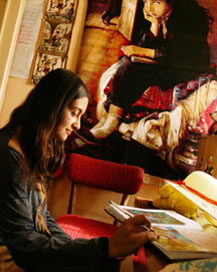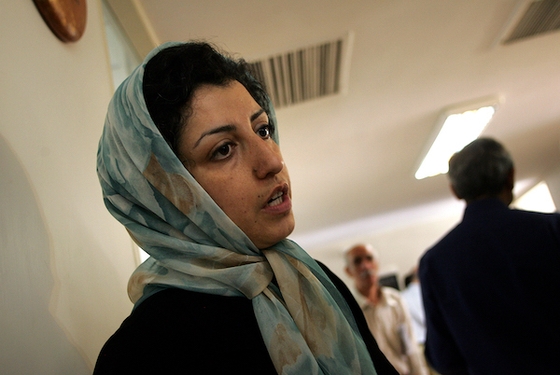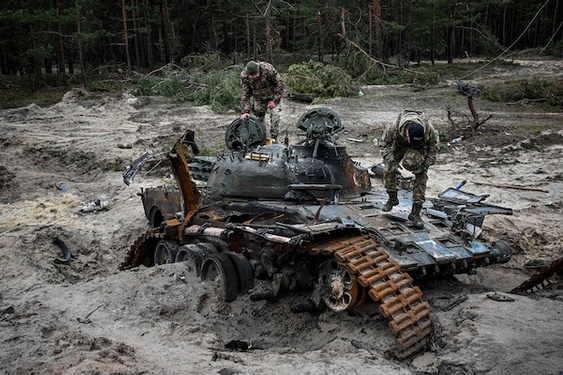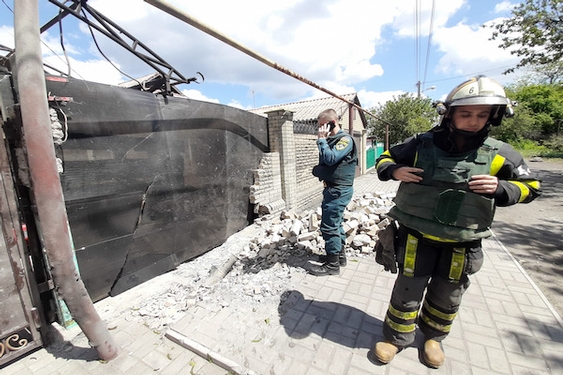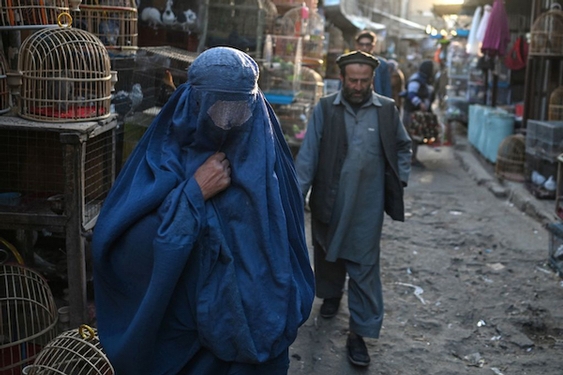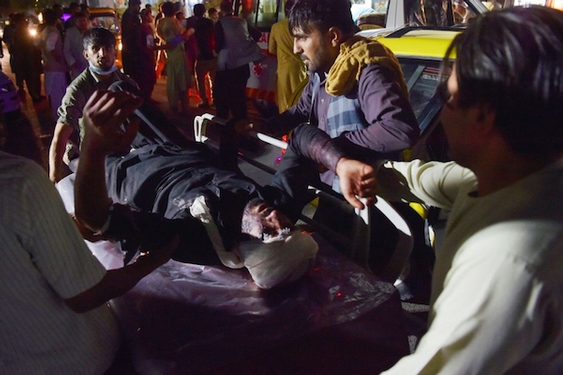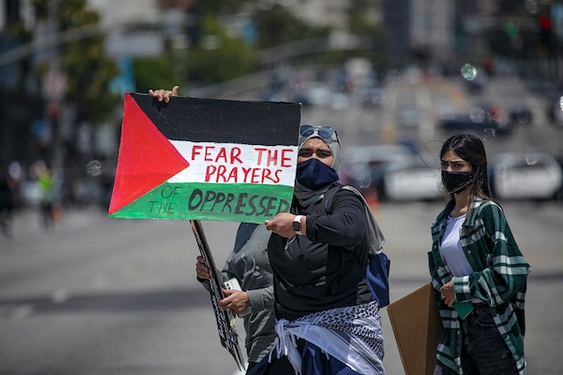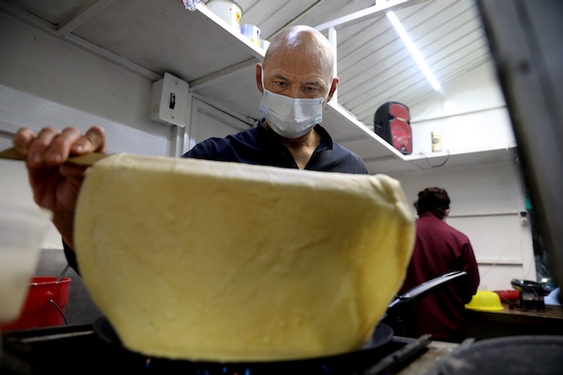Only the month before, Uzra and the other 13 Afghan girls at this high school had never done such things. They were survivors of a broken country. They had lived through the Taliban, which kept girls out of school. They had never gone to school with boys, and they always covered their hair in public.
"I didn’t have any courage when I was in Afghanistan," Uzra, 15, said in a quiet voice. "I would never raise my hand in a class with a boy."
But these girls now face a new challenge, halfway around the world: American high schools. They will arrive in the United States this month. And for an entire school year, the girls and 26 Afghan boys will study in U.S. high schools, the first foreign-exchange students from Afghanistan in 30 years.
In July, the students attended a mock U.S. high school, set up in a ski lodge in the mountains of Kyrgyzstan, a country friendly to the United States and willing to issue visas to the Afghans. The exchange program officials wanted to train the students in a third country for a month, to ease them into the transition from Afghanistan to America and allow them to work on their English, which they had learned in various ways such as in classes or from their parents. Many of the students, all 15 and 16, had never before been outside Afghanistan, or neighboring Pakistan.
Here, they took a crash course in the United States.
Like other high school exchange programs, this one tries to educate foreign students about America. No American students will travel to war-torn Afghanistan; the program is an "exchange" in ideas only.
The Afghanistan experiment is part of a relatively new program, sponsored by the U.S. State Department, that targets the Islamic world, from Morocco to Indonesia. Program alumni will theoretically go back to their home countries and become leaders. They also will know and presumably like the United States.
Of all the students involved, those from Afghanistan will be under a closer microscope than most, especially the girls. Even the country’s education officials allegedly tried to persuade the girls’ parents not to send them, worried about what might happen. Will the girls be hurt? Dance? Even date?
"It was a very difficult decision," said Mohammad Sarwar Azizi, Uzra’s father, sitting in the family’s home in Kabul. "Many Afghans would decide not to accept this program. Will it be easy for her? Will it be difficult for her? All these questions are coming to our minds and more."
Some will live in California; others will be sprinkled in small towns from Southern Pines, N.C., to Oregon, Wis. They will live in Indiana and Idaho, Virginia and Texas, Connecticut and New Jersey.
The students had different dreams of America, different hopes. Some wanted to experience Valentine’s Day and see tall buildings and movie stars, especially Arnold Schwarzenegger. Uzra wanted to see a Christmas tree.
But before that happened, the girls and boys learned to go to school together in Kyrgyzstan. They learned about American culture, slang, rules and laws.
They studied in classrooms with the U.S. map, the English alphabet and student artwork on the walls. In class, they spoke only English and learned maxims such as, "A little knowledge is a dangerous thing."
Once, Afghanistan was a beautiful country, with green grass, huge Buddha statues and ancient forts. Many of these teenagers know this – in their suitcases, they have packed postcards and tourist pamphlets from such times, the 1960s and 1970s, to show their new friends in the United States.
But the students have not seen that Afghanistan. These pictures might as well be of a foreign country. The students saw people die.
They were matter-of-fact about this, answering questions in a conflict-resolution class with the obvious: Conflict is all they have known. One boy drew clouds on his family tree for the sorrows his family has seen. The students wrote poems about war or described love "as strong as death."
"We didn’t see any peace in Afghanistan," said Yalda Faqeerzada, 16, who saw a man killed by a rocket outside her home. "We grew up in war."
They also grew up under the Taliban, which turned the women into wraiths, forcing them to wear the burqa, the loose-fitting garment that covers everything, even the wearer’s face. Women could not work; girls could not go to school.
Some girls studied in Pakistan. Others studied at home or hid their backpacks under burqas as they walked to secret schools. A few simply waited.
Despite what they have lived through, the girls seemed naive and more concerned about what gifts to buy their new American friends than anything else.
Weeks before leaving, Uzra started packing, filling a small silver suitcase with new jeans and sparkly shirts – the kind of clothes she figured American teenagers wore. The suitcase sat in the bedroom she shared with two sisters, who all slept on mats on the floor.
In her Kabul bedroom, before she left for Kyrgyzstan, Uzra said she was willing to adapt in America, learning to use the Internet, trying new food, going to classes with boys. But she said she would always cover her hair in public. She would never go on a date, or wear nail polish. She would always be an Afghan Muslim girl.
At the mock U.S. high school in Kyrgyzstan, Uzra stood outside the circle of boys, nervous.
On this afternoon, she had been told to break into this circle, however she could, as part of a class exercise. But this meant she had to touch boys’ hands. She had to shove boys.
She stood on the grass, watching the boys who held hands tightly, keeping her outside.
"Pull their pinkies back!" shouted Hawa Ansary, a girl who had already successfully pushed into the circle.
Slowly, Uzra started. She tried to pry back one boy finger at a time, moving from boy to boy, looking for the weakest link. She pushed. She laughed. Occasionally, she stepped back and covered her mouth. She could not believe she was doing this. Finally, she forced two boys to open their hands. She ran inside, breathing hard.
"It was so difficult," she whispered afterward. "I’ve never done anything like that before."
Her hands shook. In Afghanistan, boys and girls traditionally are not friends. They do not talk to each other. They certainly do not dance together or touch each other’s hands. They live in separate worlds. For most, these worlds do not converge when they grow up. Women have their own sitting rooms, their own parties, their own lives.
This school tried to get the girls and boys used to each other. In America, they would have no choice. They will have to sit in a classroom with the opposite sex. The boys might have to wash the dishes. The girls might have to kick a ball.
At first in Kyrgyzstan, the girls did not even say hello to the boys. They did not sit with them at meals. They did not come outside when the boys played Indian music and danced into the night. It was as if the boys did not exist.
Slowly, this changed. In classes, boys and girls were forced to work together. In after-school clubs, they were forced to play together. Boys learned to throw the ball to girls. They learned to joke with each other.
By the 18th day of school, the high walls between the girls and boys had dropped somewhat.
That was the day Uzra and Hawa forced their way into the boys’ circle. That evening, the drama club put on a play. Afterward, the boys and girls talked about skits, about meeting to hash out roles.
Later that night, when the music came on and the boys started to dance, some girls stayed to watch. A teacher encouraged them to dance, and they did, hesitantly, boys on one side, girls on the other. It was like any high school dance in America.
But not everyone wanted to join. Uzra saw a classmate dancing and walked back to her room, upset.
"I don’t feel comfortable," she said. "When I saw her dancing, I just cried. I just could not stop. I don’t know why."
The teachers at this school tried to get the students ready for more change. The students were told to take showers every day, which was considered a waste of water in arid Afghanistan.
While some of the teens had stopped praying, others insisted on praying at the scheduled five times a day. They left baseball games in the middle of the seventh inning and skipped the end of lunch. The teachers, from America and Kyrgyzstan, told them to be flexible, that in the public schools of America, they might not be able to pray whenever they wanted.
"But praying is the most important thing for us," Hawa, 16, said. "It’s our religion. We can’t just leave it."
Repeatedly, the students were asked how they might deal with students who cracked jokes about Islam. They were given scenarios to act out: What would they do if someone said they were terrorists? Or called one Osama bin Laden? Some said they would avoid such people. Others said they would stay quiet. Most seemed willing to do whatever they had to do to avoid any conflict.
Regardless of the subject, the students were enthusiastic. They all raised their hands to be picked to read out loud – repeatedly. Uzra consistently turned in more homework than required, and she was not alone.
When asked to sing, they loudly sang songs such as "Leaving on a Jet Plane." They eagerly learned slang, such as "I could eat a horse." They all wanted to join drama club. They loved art club. They were so over the top that it was not clear whether some would fit in.
There were other potential red flags, especially for the boys.
In Afghanistan, men are extremely affectionate with each other, holding hands and hugging. Such behavior worried teachers, who feared how Americans boys might react.
"You always say, ‘He’s beautiful, he’s lovely,’" teacher Angela Bowden, an American Peace Corps volunteer, told the boys in her class. "But watch how you say this, because some people might take it the wrong way."
The boys all said they understood. Yet the next day, on the field trip in Bishkek, one of Bowden’s students walked hand in hand with another boy. The people of Bishkek stared.
By the middle of this month, all the Afghan students will have arrived in America. They will meet their host families and get ready for school. Some host families will be Muslim. Most live in small towns and suburbs.
Uzra worried. She had already removed her head scarf, despite her earlier pledge. But she never talked to the boy who shared a table with her in homeroom. As for wearing makeup, never. She bought glitter polish with silver stars, but not for her nails. She liked the way it looked inside the bottle.
"They say, ‘If you come back from America, you will be this way,’" she said. "I think, if a person does not want to change, they don’t have to, right? But they say, ‘No, you will be hugging boys, you will be going to dinner. It will be hard for you.’"
© 2004, Chicago Tribune. Distributed by Knight Ridder/Tribune Information Services.


